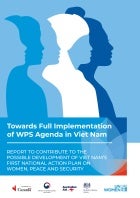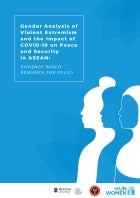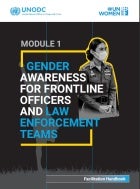1 - 20 of 27 Results
Pagination
Date:
This framework ensures that all efforts are aligned and focused on achieving sustainable change, helping to realize the vision of preventing and eliminating GBV in the country.
Date:
The ‘Gender Strategy of the National Police of Timor-Leste (2024-2028)’ was jointly developed by the National Police of Timor-Leste, with technical support from UN Women and generous support from the Government of the United Kingdom, the Government of Canada and the Government of the Republic of Korea under the UN Women ASEAN programme Empowering Women for Sustainable Peace: Preventing Violence and Promoting Social Cohesion.
Date:
In January 2024, Timor-Leste's 9th Constitutional Government approved the second phase of NAP 1325 (2024-2028) highlighting the country's commitment to Women, Peace and Security agenda.
Date:
he NAP II has concrete and immediate action to provide conflict-affected with a recognition that they are conflict victims with rights to reparation and justice from the state, along with dedicated support, services and resources that allow them to rebuild their lives with dignity.
Date:
Significant progress has been made in the second year of implementation (January to December 2022) of the project, with all annual targets achieved and 43 percent of immediate outcomes and output-level project targets already reached or surpassed, while the remaining targets are on track. The highlights of the progress and results attained by outcomes are featured in this document
Date:
This country profile provides an overview of the crisis in Myanmar, how the UN Women Myanmar team and our partners are supporting vulnerable women and girls, and our 2022-2023 strategic priorities in Myanmar.
Date:
In India, there are multiple laws to ensure gender equality in the corporate sector. Women continue to be underrepresented in the corporate sector. Globally women make up only 17 per cent of the board of directors in listed companies and 10 per cent of higher management. In this research study, we examined the implementation effectiveness of three recent laws introduced to strengthen commitment to gender equality in the Indian corporate sector.
Date:
The objective of the report is to examine the legal gaps that are hindering expenditure allocation and reporting on the landscape of expenditures on GE. Subsequently, a step-by-step roadmap has been presented to strengthen the development, implementation and tracking of gender-responsive budgets toward the achievement of national commitments to the SDGs.
Date:
This study aims to assess the status and results of the implementation of social protection for women and girls within the framework of Resolution No. 15-NQ/TW on a number of social policy issues for the period 2012-2020 in Viet Nam. The report provides policy recommendations to provide information to complete a new document on Social Policy for the period of 2023 - 2030, with a vision to 2045 and focus on advocating for gender responsive social policies.
Date:
The main objectives of this report are to: a) review six NAPs to implement global, regional and national normative frameworks on WPS that can inform the NAP path for Viet Nam. More precisely, this report seeks to evaluate how the plans have intersected the pillars of the WPS agenda and how their lessons learned can be applied to the Vietnamese context, and b) to propose a feasible and effective road map for the building of a NAP for the period 2021-2030 drawing from existing Viet Nam priorities.
Date:
This report has been conducted during the first year of the ‘Master Plan on Socio-economic Development of Ethnic Minorities and Mountainous Areas 2021-2030’ and compiled by the Institute for Social Development Studies (ISDS) and the United Nations Entity for Gender Equality and the Empowerment of Women in Viet Nam (UN Women).
Date:
This report identifies both the persistent trends and changing gender dynamics of violent extremism in the context of the COVID-19 pandemic, based on an expert survey and interview research conducted between July and November 2021. It examined how and to what extent misogyny and hostile beliefs are fuelling violent extremism in the Southeast Asian region during the pandemic, the degree to which misogyny and hostile beliefs in the ASEAN region are fuelling violent extremism, and how these manifest themselves in the offline space.
Date:
UNODC and UN Women jointly developed three training modules aiming to strengthen the capacity of law enforcement to apply a gender-responsive and victim centered approach to carry out investigations related to trafficking in persons and other criminal activities.
Date:
The two National Target Programs on New Rural Development and Sustainable Poverty Reduction for the period 2016-2020 have achieved important results. There have been more than 6 million people escaping poverty, approximately 2 million people escaping near poverty; 62.4 per cent of communes met the New Rural Development standard. However, there are still sizable gender gaps in terms of employment, property ownership, and access to public services in rural areas, especially in poor districts.
Date:
The Review report on the implementation of the National Strategy on Gender Equality (NSGE) 2011-2020 presents an overall review in realizing the objectives, targets and solutions of the NSGE 2011-2020 which serve as a basis for devising NSGE 2021-2030. In addition, the report provides analyses on achievements coupled with obstacles and challenges in the implementation of the NSGE 2011-2020 at various levels of national, ministerial/sectoral and local levels.
Date:
This GRB Timeline showing the sequence of TL Government’s effort with the line ministries, CSOs, private sectors, development partners and academia in pushing forward the country’s commitment to achieve gender equality through assuring gender sensitive budget at workplace.
Date:
This guidance document provides a foundation how to implement human rights principles in the Philippine business setting. Premised on the UN Working Group on Business and Human Rights' which emphasizes that "a gender perspective is always appropriate for all States and businesses in all situations," this document underscores that gender is a cross-cutting concern in securing a better future for people, planet and prosperity.
Date:
This study explores the experiences and views of women police officers from across the ASEAN region. It seeks to better understand the opportunities and challenges associated with women’s representation, roles and meaningful participation in law enforcement work, and provides a series of recommendations to further enhance such participation.
Date:
This report documents lacunas in the existing legal framework and implementation process over the years. The thorough analysis that underpins this critically reflective document also subsumes the perspectives of the provincial public functionaries and stakeholders.
Date:
This publication has been developed within the framework of the project entitled Empowerment of Ethnic Minority Women and Girls Through Gender Responsive Budgeting Policies And Programmes, as a project between the Department of Ethnic Minority Affairs of the Committee for Ethnic Minority Affairs (CEMA) and UN Women with financial support from Irish Aid in Viet Nam.

![[cover]](/sites/default/files/styles/search_image_140px/public/2025-01/ws-c1438-english-pola-puipui-cover-960px.jpg?itok=PRIMSmmE)
![[cover]](/sites/default/files/styles/search_image_140px/public/2024-11/gender_strategy_english_draft-960px.jpg?itok=LQ1B-nZ3)
![[cover]](/sites/default/files/styles/search_image_140px/public/2024-02/tl-c636-VI-Final-NAP1325-cover-960px.jpg?itok=9RRYn-14)
![[cover]](/sites/default/files/styles/search_image_140px/public/2023-11/np-english-nap-2023-960px.jpg?itok=TZapkFF9)

![[cover]](/sites/default/files/styles/search_image_140px/public/2023-08/mn-unwomen-myanmar-country-profile-2023-960px.jpg?itok=7unIV0hV)
![[cover]](/sites/default/files/styles/search_image_140px/public/2023-01/in-WEA-Report-India-2022-960px.jpg?itok=IlV-z94F)
![[cover]](/sites/default/files/styles/search_image_140px/public/2022-12/vn-Analysis-of-GE-mainstreaming_960px.jpg?itok=T7qqazX2)
![[cover]](/sites/default/files/styles/search_image_140px/public/2022-12/vn-Social-protection-for-women-and-girls-2012-2020-EN-960px_0.jpg?itok=_3B0H-Kn)

![[cover]](/sites/default/files/styles/search_image_140px/public/2022-06/vn-ISDS_Report_DMaEMW_EN_20220530-cover-1679px.jpg?itok=fv_kbXfB)


![[cover]](/sites/default/files/styles/search_image_140px/public/Field%20Office%20ESEAsia/Images/2021/12/vn-PROMOTING-GENDER-MAINSTREAMING-ENG-1679px.jpg?itok=tAwwt8JZ)





